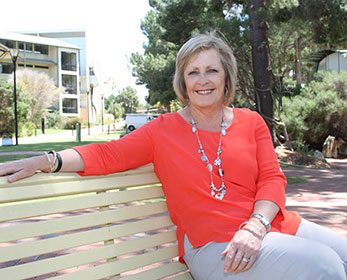Edith Cowan University's Speech Pathology team will facilitate a key component of a multimillion-dollar national project surrounding mild brain injury and concussion.
Named AUS-mTBI, the initiative will see the Federal Government contribute $3 million from the National Health and Medical Research Council’s Medical Research Future Fund towards improving care and treatment for people who have suffered mild traumatic brain injury (TBI).
ECU Foundation Chair in Speech Pathology Professor Beth Armstrong will work with a team of Aboriginal and Torres Strait Islander researchers, clinicians, and people who have lived with TBI in a component of the study which will aim to ensure the project meets the specific needs of First Nations Australians.
Professor Armstrong and her team at ECU have extensive experience in care for Aboriginal Australians with TBI, as leaders of the Healing Right Way and Yarning Circle programs, among others.
"Our component of the project will ensure the data gathering processes are culturally secure and treatment pathways recommended are both culturally appropriate and accessible," Professor Armstrong said.
"The Aboriginal Research Coordinator and the WA Research Officer will both be located at ECU in new positions created for the project."
TBI is caused by incidents such as car accidents, sports injuries, assaults and falls, and can significantly change a person’s life overnight by potentially affecting their mobility, cognition, communication and behaviour.
"Even mild brain injury can have long lasting effects including difficulties in concentration, memory, communication, mood and problem-solving abilities," Professor Armstrong said.
Treating the effects of mild TBI can be difficult due to the difficulty in predicting recovery, meaning many people are discharged from hospital with little understanding of how they will live with their injury.
Often, the responsibility for monitoring change and seeking help falls to the person themselves or their family.
"People are often lost to the system and ongoing support can be limited," Professor Armstrong said.
"This is particularly true for Aboriginal and Torres Strait Islander people living in rural and remote areas, with over 80 per cent of Aboriginal people with brain injury in Western Australia living in these locations."
The AUS-mTBI project aims to address this by better predicting who will and won't benefit from treatments.
It will also trial new online resources for those who have experienced mild TBI.
The Aboriginal and Torres Strait Islander component of the project will gather information capturing context relevant to different First Nations communities, ranging from Queensland and New South Wales to Western Australia.
Professor Armstrong said the project will also have implications for First Nations peoples internationally.
 A national project will look at improving care and treatment for people who have suffered mild traumatic brain injury.
A national project will look at improving care and treatment for people who have suffered mild traumatic brain injury.



